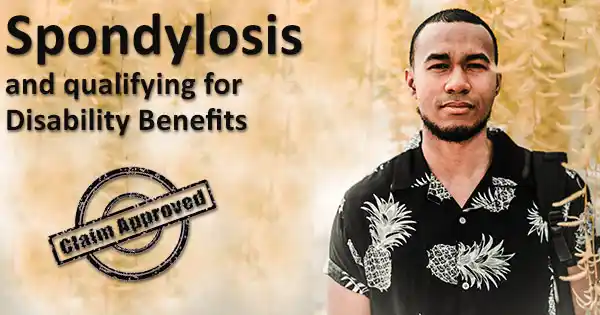Obtaining disability benefits for Spondylosis
Author: Attorney Lloyd Bemis
Updated: 7/19/2024
Can I get disability benefits if I am suffering from the effects of Spondylosis?
To qualify for SSDI with spondylosis, you must prove that your symptoms are severe enough to prevent you from working due to pain. While spondylosis is not specifically listed in the Blue Book, you may qualify if your disability is equivalent in severity to a listed disorder, such as nerve root compression. You need to provide evidence of nerve root compression, radiating pain, and physical limitations like needing an assistive device. Medical records are crucial in proving your disability to Social Security. If your spondylosis symptoms do not match a Blue Book listing, you can still qualify for SSDI if you can demonstrate that your condition prevents you from working.
Can I get disability benefits if I am suffering from the effects of Spondylosis?
Spondylosis is a form of spinal arthritis that can lead to neck pain, back pain or loss of normal spinal function. Often called spinal osteoarthritis, the term is often used interchangeably with degenerative disc disease, but should not be confused with spondylitis, an inflammatory form of arthritis. If you are suffering from the effects of Spondylosis you may qualify for disability benefits.

It is estimated that 85% of adults over the age of 60 experience some degree of spondylosis, but is a relatively common condition that may even begin between the ages of 20 and 50.
While some cases are not serious, others can result in pinched nerves and serious symptoms that prevent a person from holding any type of job.
Some people with spondylosis have no symptoms, while others have symptoms that come and go or become worse with time and certain activities, such as sitting for a long period of time.
The most common symptoms include:
- Back pain
- Neck pain
- Headaches
- Muscle spasms
- Inability to turn the head or bend the neck
- Loss of balance
- Difficulty walking
- Lack of coordination
- Grinding noise or popping when turning the neck
- Numbness or tingling in upper and lower extremities
- Shooting pain down the leg
- Incontinence
Any of the above symptoms can interfere with your work life.
If spondylosis leads to nerve root compression, it can impact your ability to walk. Numbness and weakness in your fingers can prevent data entry, styling hair, or other jobs that require manual dexterity.
Unfortunately, spondylosis is irreversible because it is a degenerative process.
Treatment focuses on relieving back and neck pain using medications such as anti-inflammatories, analgesics, and muscle relaxants. Other therapies include exercise, physical therapy, chiropractic, and acupuncture. In cases where spondylosis causes nerve compression or affects an individual’s mobility, surgery may be considered.
Demonstrating that you are following your doctor’s treatment plan is an important part of qualifying for disability benefits.
How can I qualify for SSDI if I have Spondylosis?
If your spondylosis symptoms are advanced and you are unable to work because of pain, you may be eligible for disability benefits.
Social Security has created a manual called the Blue Book which lists impairments Social Security considers disabling and may automatically qualify for benefits. Spondylosis is not mentioned specifically, but you may be able to qualify if you can prove your disability is equivalent in severity and duration to a listed disorder. For example, if spondylosis has led to nerve root compression, you may be able to satisfy the requirements of Section 1.15 Disorders of the skeletal spine resulting in compromise of a nerve root(s).
To qualify under this listing, you must show ALL of the following:
- Evidence that your nerves are affected and you experience 1) muscle weakness, 2) nerve root irritation, tension, or compression, and 3) either sensory changes such as decreased sensation or sensory nerve deficit, or decreased deep tendon reflexes;
- Radiating pain, paresthesia (prickling or “pins and needles” type sensation), or muscle fatigue consistent with compromise of the affected nerve root;
- Imaging from MRI or CT scan showing compromise of a nerve root in the neck or lower back; AND
- One of the following physical limitations:
- Needing an assistive device that requires 1) the use of both hands such as a walker, bilateral canes or crutches, or a wheelchair, or 2) the use of one hand, but you’re unable to use the other hand for work-related activities, or
- The inability to use both hands for work-related activities.
You will be expected to provide complete medical records to Social Security, including:
- A physician’s diagnosis of degenerative disc disease
- x-rays, CT scans, MRIs and other imaging providing evidence of nerve root compression and disc deterioration
- Detailed descriptions of pain levels and motor function limitations
- Treatment notes from your doctor(s) detailing treatments and prognosis
- A list of every medication you’ve taken in the past year and your response
- Laboratory tests and results of blood work
- Records of hospitalizations and surgery
- Records from physical therapy appointments
- Records for massage, acupuncture, and chiropractic treatments
You also need to show that you are receiving regular medical treatment and following your doctor’s instructions.
A written statement from your doctor regarding your diagnosis and outlook for your recovery is extremely helpful. Be sure to see your doctor at least once every two months and discuss any difficulties you are having, such as trouble bending down to pick something up or sitting for long periods of time. Medical records that document how spondylosis has impacted your daily life very specifically over a period of months will have a greater influence on the SSA’s determination than a general statement that you have. Inform your family and friends about your condition. Social Security may call an applicant’s family members and friends to get further information about the applicant’s impairment.
If your spondylosis symptoms don’t match a Blue Book listing, you may be able to qualify for Social Security Disability benefits if you can demonstrate your medical condition prevents you from working at your old job or any other job.
Social Security is primarily interested in your functional limitations and how they impact your daily life. You may be experiencing pain, headaches, loss of coordination, difficulty walking and numbness in your fingers that affect your ability to do physical work or sedentary work. Keep a diary of your symptoms for at least 30 days to show how your daily life is impacted. Can you do laundry, shop for groceries, or pick up objects that you’ve dropped? Social Security will conduct a Residual Functional Capacity (RFC) assessment to evaluate your physical and mental capabilities to determine if there is any job you can do, taking into consideration your age, education and whether or not you can drive. Even better, ask your doctor to fill out an RFC form. If Social Security decides you cannot do your old job or don’t have the skills to perform a new job, you may be approved for a Medical-Vocational Allowance.
“Once Social Security determines the limitations caused by your condition, they will employ a vocational expert to assess whether a person with these limitations is employable. Most vocational experts will find a person to be unemployable if their condition or the treatment rendered for the condition causes the person to regularly be absent two or more days a month or be “off-task” 15% or more of the workday.”
Your Free Initial Consultation
Call now:
At Bemis, Roach and Reed, if we can't help you, we will try to find the right attorneys for you.
We offer each of our prospective clients a free no obligation one hour phone or office consultation to see if we can help you and if you are comfortable with us. We know how difficult a time like this can be and how hard the decisions are. If we can be of assistance to you and help you find a solution to your issue we will, even if that means referring you to another attorney.
Let's get you Started:
If you could provide us with some basic information about your claim we will get right back with you with a free case evaluation and schedule your Free Consultation Today.
You can also email us at: contact@brrlaw.com
Disability Benefits FAQs
Social Security has some basic financial requirements.
Before you are eligible for Social Security disability benefits, you must satisfy some basic financial requirements. You must: 1) have a disability that has lasted or is expected to last 12 months; and 2) you must have worked in a job where you paid Social Security taxes long enough and recently enough; and 3) you must not earn more than Substantial Gainful Activity (SGA), which is $1,620 per month in 2025 for nonblind applicants and $2,700 per month for blind applicants.
Basic SSDI Requirements –>
You may also be eligible for Social Security Disability benefits if you have another medical condition.
One disorder alone may not meet the criteria of an impairment as stated in Social Security’s Blue Book, but if you have more than one medical condition, Social Security must consider how those health issues combined limit your ability to hold a job and perform necessary daily tasks.
Disability for Multiple Impairments –>
If you are 55 or older or have another medical condition you may get approval.
Applicants who are 55 or older often fall under a grid rule, which means they are not expected to learn a new job.
Disability for those over 55 –>
How much does a disability lawyer cost?
Disability lawyers charge on a contingency basis, meaning they only collect a fee if you win your case and are awarded disability benefits. Federal law sets the amount that attorneys can charge which is based on a percentage of past-due benefits you are owed up to a fixed amount, whichever is less. So, there are no out-of-pocket costs for you.
Disability Lawyer Costs –>
Should you file a claim?
If you believe that you meet Social Security’s medical and financial requirements, you should apply for benefits. If you are still unsure or would like to talk to someone, please contact us at 512-454-4000. We are always ready to take your call and discuss your options with you free of charge. We are happy to help folks just like you find the best solution for their personal situation.
How do I file for Social Security Disability benefits?
Once you have decided to file a claim, you can take the first step and apply for Social Security Disability benefits in person at your local Social Security Administration office, online, or over the phone.
How to Apply for SSDI –>
Appealing denied benefits
Most who file are denied initially. That doesn’t mean you won’t qualify; you just need to file an appeal.
There are four steps to the Social Security appeal process.
SSDI Appeals Process –>
Do I need a disability attorney for SSDI?
You may certainly file a claim on your own, but evidence shows that your chances for approval are increased significantly if you have legal representation.
Do I need an SSDI attorney–>
What if I don’t qualify for SSDI?
If you haven’t worked long enough to earn enough work credits, or if you earn too much income, you may be eligible for disability benefits through another Social Security program, such as Supplemental Security Income (SSI), or from a long-term disability insurance plan through your employer or a privately purchased policy.
What is Supplemental Security Income or SSI?–>
I have long-term disability insurance – should I file a claim?
Absolutely – you should file a claim as soon as you become disabled.
LTD Disability Appeals Process–>
Disability benefits are an important source of income for those who are unable to work. If you are not able to work due to accident or illness, you may be eligible for Social Security Disability or Long Term Disability benefits. If you have applied for benefits and been denied, contact the attorneys at Bemis, Roach and Reed for a free consultation. Call 512-454-4000 and get help NOW.

Kind Words from Our Clients
“The attorneys and staff at Bemis, Roach & Reed have provided me and my husband, Jeff, with stellar advice, care, and service. They made navigating the SSDI process easy, painless, and as timely as possible. During this difficult time in our lives it was a tremendous relief to know they were on our side and keeping us updated on next steps and timelines. We also had questions about my husband’s long term disability insurance and they helped us get those questions answered and resolved without any additional fee. I highly recommend Bemis, Roach & Reed.” – Kelli G
“I needed a lawyer for my case and had googled best lawyers. They came up first on my list and decided to give them a call. From the moment I called I knew I chose the right people. They said they would fight for me and fight they did. They knew what they were doing and kept good communication throughout the process. If you need someone that will listen, understand, and fight then these are the people. HIGHLY RECOMMEND.” – Marcel L.
“I’ve had a great experience working with Bemis, Roach & Reed for my disability case. I spent two years fighting on my own, until I was informed to look for a disability lawyer. Right away, sending in questions was a breeze, and from the moment my case was accepted, everything became a major weight off my shoulders. My newest appeal was filed for me, my medical records and case history sorted for me, and I could finally focus on my appointments and treatment with a little less worry. Everything was explained to me in a way that made sense, the process was set out in an easy to understand way. And, just like that, at the beginning of July 2023, my claim was accepted!” – Sunshinemutt






